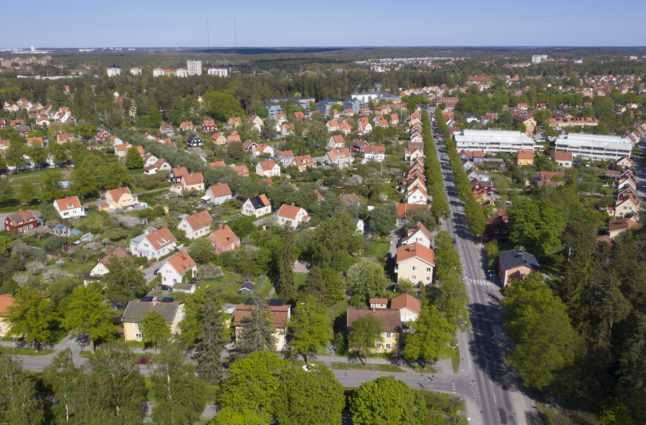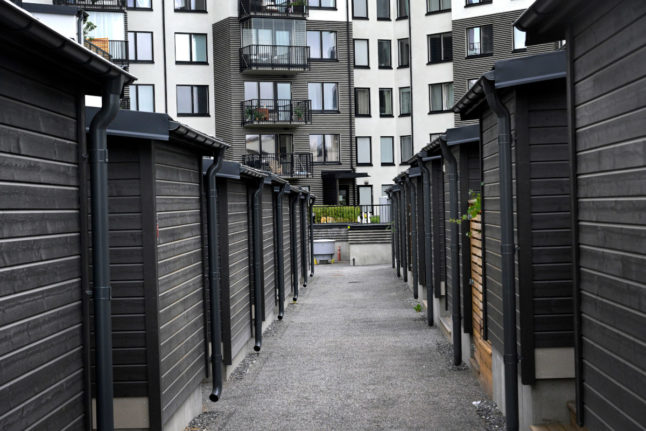In a post on Facebook, we asked The Local readers to submit their questions on property. Here, we answer some of them.
Have house prices stabilised?
First off, all predictions about the future economy obviously need to be taken with a pinch of salt, and we recommend that you do your own independent research before deciding to buy or sell a property.
Having said that, most experts, including Sweden’s central bank, the Riksbank, seem to think that property prices in Sweden haven’t yet stabilised. The Riksbank predicted a further drop in property prices of around 8 percent throughout 2023 in a report released in November 2022, with prices plateauing towards the end of the year, and a total 19 percent fall in prices since the last peak in spring 2022.
If, however, it takes longer than expected for inflation to come down, or if Sweden’s central bank continues to hike interest rates throughout 2023, prices could drop even further.
Is now a good time to buy?
Again, it’s difficult to say with any certainty whether you should buy or wait, and the decision of whether to buy now or not depends on your own circumstances and your own finances.
If you’re a first-time buyer who has been waiting for prices to drop for some time and you can afford the higher interest payments and monthly fees, then it may be a good time for you to buy a property at a lower price than a year or even a few months ago.
If you can buy in cash and avoid a loan altogether, then the lower cost of housing due to high interest rates could make this an attractive time to buy – just be aware that you may not be able to sell for the same amount you bought for, so only buy a property you’re planning on living in for at least a few years.
If, however, you currently live in a property you bought when prices were higher in 2020 or 2021, you risk losing money if you sell. If you’ve got a fixed-rate mortgage at a low interest rate, it may be a good idea to wait it out until the market improves.
We covered this question in an article from July 2022 which you can read here. Obviously, prices have continued to drop and lending costs have continued to rise since then, but some of the insights in that article are still relevant.
Either way, make sure if you do make the decision to buy that your finances can handle your interest rates, electricity costs and monthly fees increasing and staying at a high level for some time.
Is it better to buy or rent?
The answer to this question depends on a few things, such as how long you’re planning on staying in Sweden, your personal finances, and where in the country you’re looking for property. Rural areas are often cheaper to buy, and rental properties can be more scarce. Cities, however, are more expensive, and there’s more competition for the rental properties on offer.
Buying property has historically been a good investment in Sweden, but this varies depending on the type and location of the property, and there’s certainly no guarantee you’d sell for a profit – especially in the current market, where prices have dropped over 20 percent in some areas.
This is something foreign residents should consider especially carefully; if you had a job opportunity or family emergency that meant you needed to leave Sweden, you may not have the chance to wait out a bad spell in the markets, and you don’t want to end up in negative equity, where you owe money to the bank even after selling your home.
It’s also much harder to rent a property you own in Sweden: a bostadsrättsförening will often only allow sublets for a limited time before you have to move back into the property, so you can’t just rent it out indefinitely while you wait for the market to improve.
Even if you do make a profit, sellers are required to pay Swedish capital gains tax on 22 percent of any property profits, although you can defer this indefinitely if you use the money to buy a new home either in Sweden or within the EU/EEA.
Compared to many countries, the Swedish system is not designed for property owners to make money. In many cases, however, that’s exactly what happens, but it’s not a safe investment.
Should I buy an apartment or a house?
Again, this depends on your personal situation and also your personal preferences. Do you need the extra space you’d get from owning a detached house or villa? Can you afford a house in the area where you’re looking? Do you want a garden or would it be too much of a hassle?
Would you rather pay a monthly avgift (fee) to your housing association and know you don’t need to worry about fixing the roof or replacing the windows, or are you good at DIY and happy to sort out the upkeep of your house yourself?
Another aspect to think about is heating. Apartments and terraced houses often have fjärrvärme (district heating), which is cheaper than other forms of heating, and it may be included in your monthly fee or avgift, meaning you pay an average cost based on the usage of everyone in your housing association rather than a variable cost each month. In general, apartments often use less energy than houses to heat, too, meaning heating costs are likely to be lower.
Houses, on the other hand, can have a variety of different heating systems, ranging from the most expensive direktverkande el (direct electric heating), to cheaper options such as bergvärme (downhole or borehole heat exchanger). Some terraced houses have fjärrvärme, but might be billed individually, so double-check this before you buy.
Consider if you can afford to pay for the higher heating cost or the cost of changing the heat source. What may seem like an insignificant detail on a property ad could end up costing you tens of thousands of kronor if you end up buying.
What is included in the avgift?
We touched on this above, but essentially, your monthly avgift in a housing association (BRF) covers costs like rubbish collection, maintenance of the building and heating and electricity for shared areas in apartment buildings like the laundry room, basement, storage rooms and cellar. The avgift varies between different apartments in the same building and is usually calculated by size, so larger apartments will pay a higher fee.
In larger housing associations it could also cover the costs of a full-time building manager, cleaner or gardener, for example. It also covers paying off your BRF’s loans, for example if the BRF is relatively new and took out a loan to buy the building from the previous owners, or if it has recently undergone some major improvements. Sometimes, your apartment’s electricity will also be included in your avgift.
These last two costs are part of the reason why so many housing foundations have recently increased their avgift. Higher interest rates and higher energy prices increase the costs for the BRF, which are then financed by the residents.



 Please whitelist us to continue reading.
Please whitelist us to continue reading.
Member comments